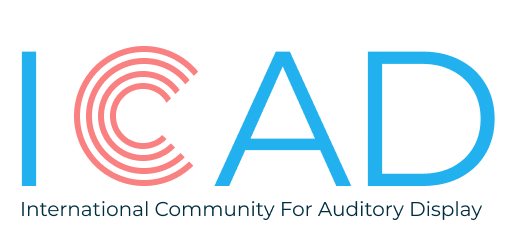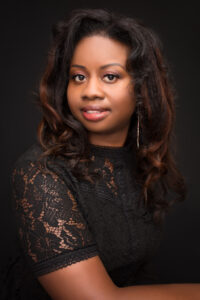ICAD 2021 Conference General Co-chair
So, who are you?
I am Dr. Kyla McMullen. I was born and raised in N.E., Washington DC. I earned a Bachelor of Science in Computer Science from the University of Maryland, Baltimore County (UMBC). Following this, I earned a Masters’s and Ph.D. in Computer Science from the University of Michigan. I am currently a tenure-track faculty member in the Computer & Information Sciences & Engineering Department at the University of Florida.
My research interests broadly focus on the technological, psychoacoustical, and human factors aspects of 3D sound, which is incorporated into virtual and augmented reality applications. My lab also focuses on rapid selection, customization, and computation of head-related transfer functions.
How did you end up working on Sonification and Auditory Displays?
Two words: “Greg Wakefield”. After not finding a suitable “fit” in a research lab, I went to Dr. Wakefield for advice. We finished out a research project I had begun in my previous lab. Afterward, he invited me to work on a project in a new (to me) research area called “3D Audio”. I thought it was magical. We were using signal processing to create these magical kinds of sounds that I had never heard before. Once I heard 3D audio for the first time, I was hooked.
What is the role of Sonification/Auditory Display in your research?
Since my research lies broadly in the technological, psychoacoustical, and human factors of 3D sound applications, the auditory display is how we validate the perceptual experience of our work. Whether it’s for making realistic navigation cues for first responders or pure psychoacoustic research on how noise affects localization, an auditory display must be used.
What is the most challenging part in your work?
Since HRTFs (Head-Related Transfer Functions) are individualistic to each person, each listener’s experience is as unique as their anthropometry. Because of this, it’s difficult to guarantee that 2 users will have the exact same perceptual experience.
Anything special ICADders should know about you?
I love music in all shapes and forms, especially the energy of live music (the genre almost doesn’t even matter). I’m a dancer first, so perhaps we should open up the yearly jam sessions for those who would like to contribute movement in addition to sound : ) I’m also learning live audio mixing which has been an adventure to move the theoretical to the practical, in real-time.
What would you like to say to ICADders?
ICAD has been one of the most welcoming research communities that I have experienced. I (along with my advisor) attended my first ICAD in 2010 when it was in my hometown, Washington, DC. Dr. Agnieszka Roginska presented the collaborative paper that she, my advisor, and I had gotten accepted. This was my first publication in this “new” research area and I was elated. Everyone was very open to chat and I was genuinely excited to hear about all of the other researchers’ work in this area. I have attended many more ICADs over the years (when possible), and I always look forward to the gathering, almost like a family cookout : )
What is your favorite sonification/auditory display ever?
I think Charlie Morrow’s Soundscapes are pretty cool. I can’t (won’t) pick a fav but I find myself listening to the Central Park and Chicago ones the most. Here’s a playlist:
https://www.youtube.com/watch?v=JWoolZ4CscU&list=PLFwoiAbnek3NFzH6OikBEgRk7NVe82gyn
What is the study/tool/work in the field of auditory display you are most proud of?
I am very proud of some sounds we (my lab) have recently been able to create, using HRTFs that have been acoustically simulated using HRTFs created from a detailed head mesh. Here’s a sound created from the mesh that follows a circular path around the listener’s head (horizontal plane only). https://drive.google.com/file/d/1wX-i5fPU4ScPr4KOVJI055G82gfaoU6B/view?usp=sharinghttps://drive.google.com/file/d/1wX-i5fPU4ScPr4KOVJI055G82gfaoU6B/view?usp=sharing
Any way to learn more about your work or reach out to you?
My email address is drkyla@ufl.edu. Feel free to reach out to me anytime or tweet me @Dr_Kyla
I also cohost 2 podcasts. One is called Modern Figures (a play on the “Hidden Figures” movie title) in which we highlight influential Black women in computing. Our website is www.modernfigurespodcast.com. The second is Unstoppable Minds Podcast, showcasing the challenges and triumphs that come with a career in academia and research at the University of Florida: http://ufl.edu/unstoppableminds/


